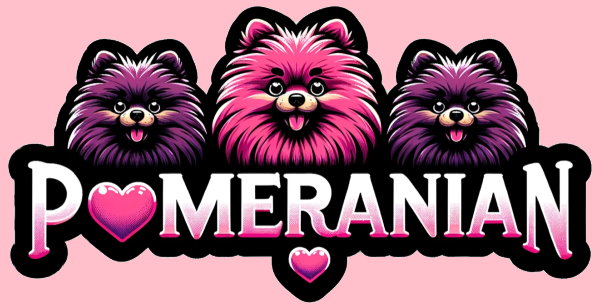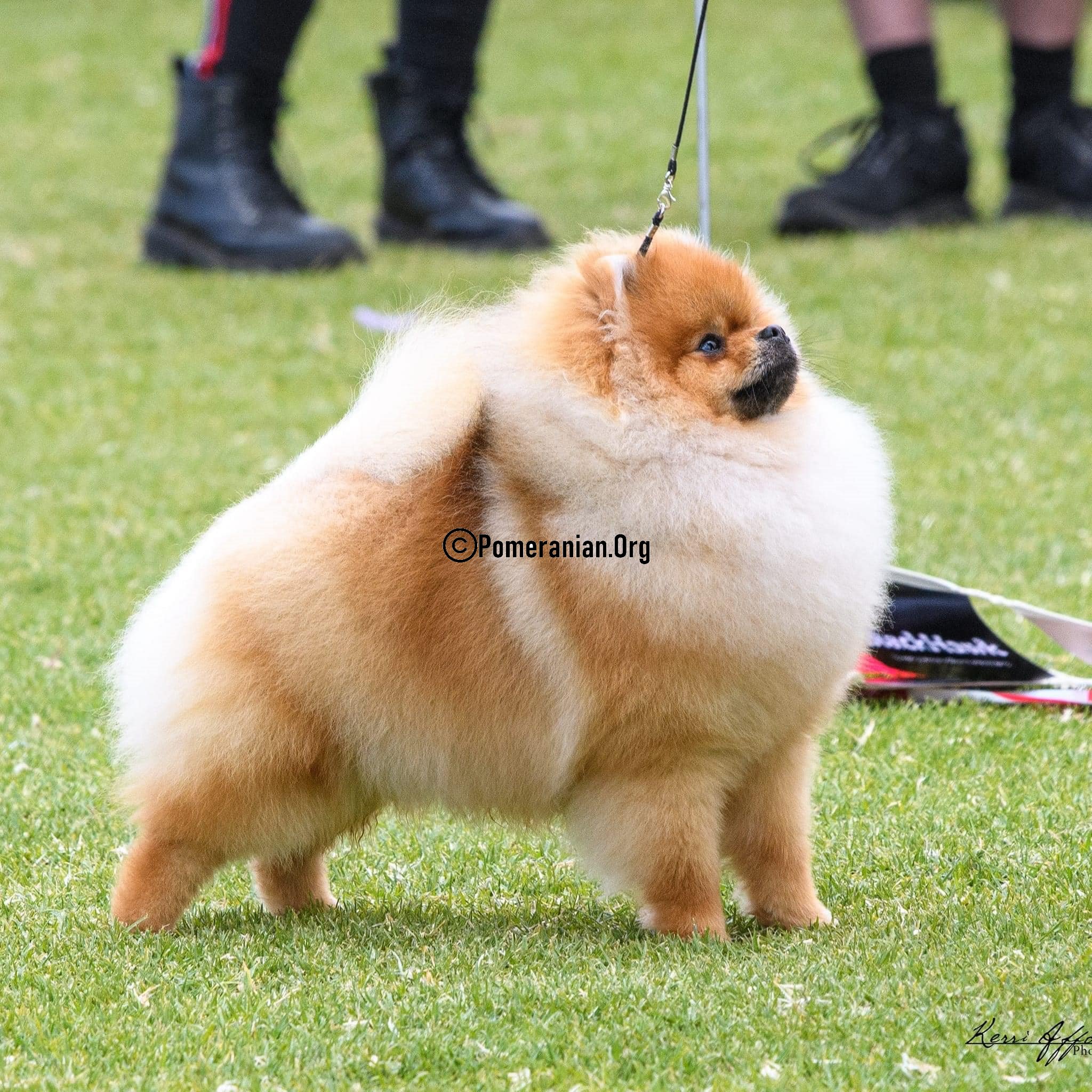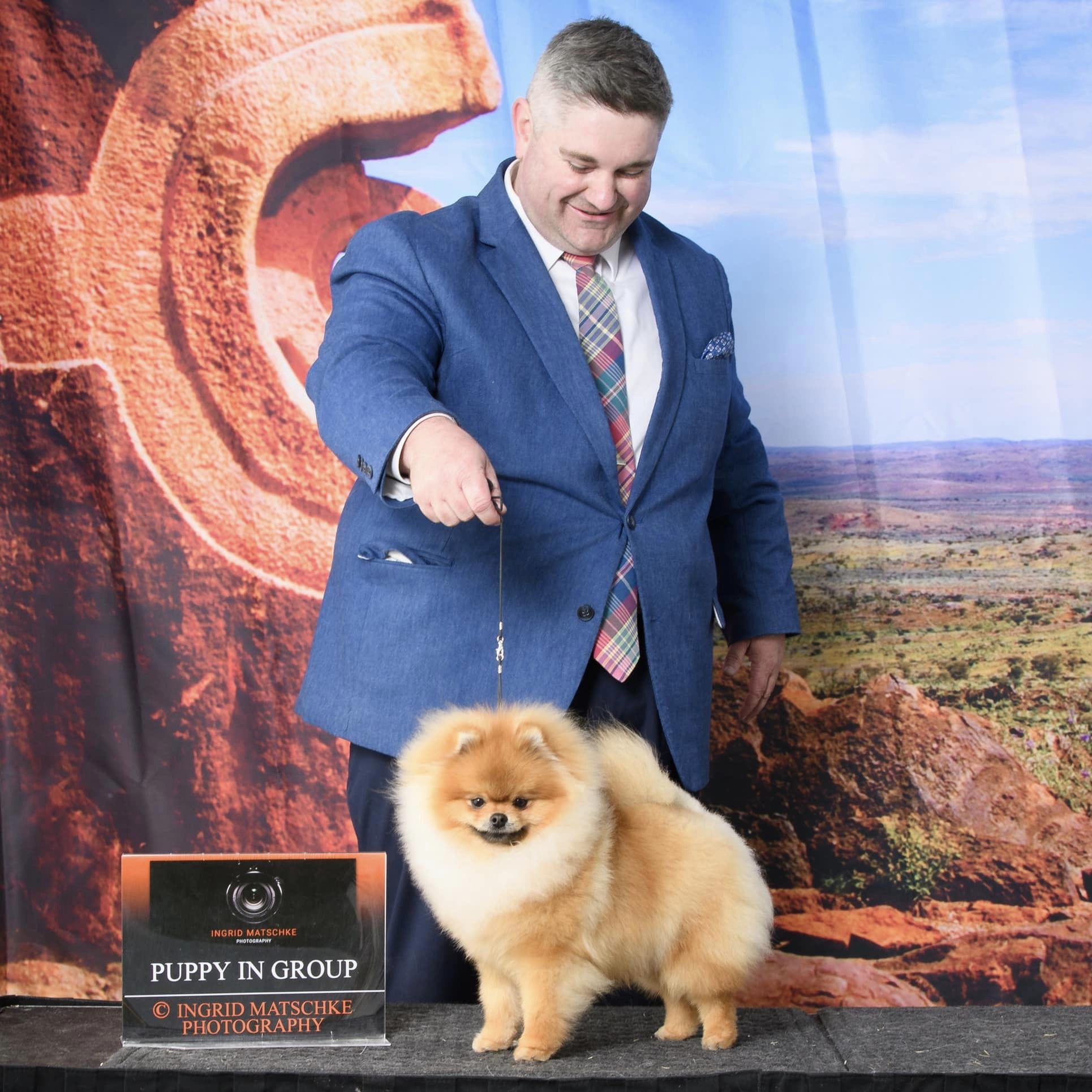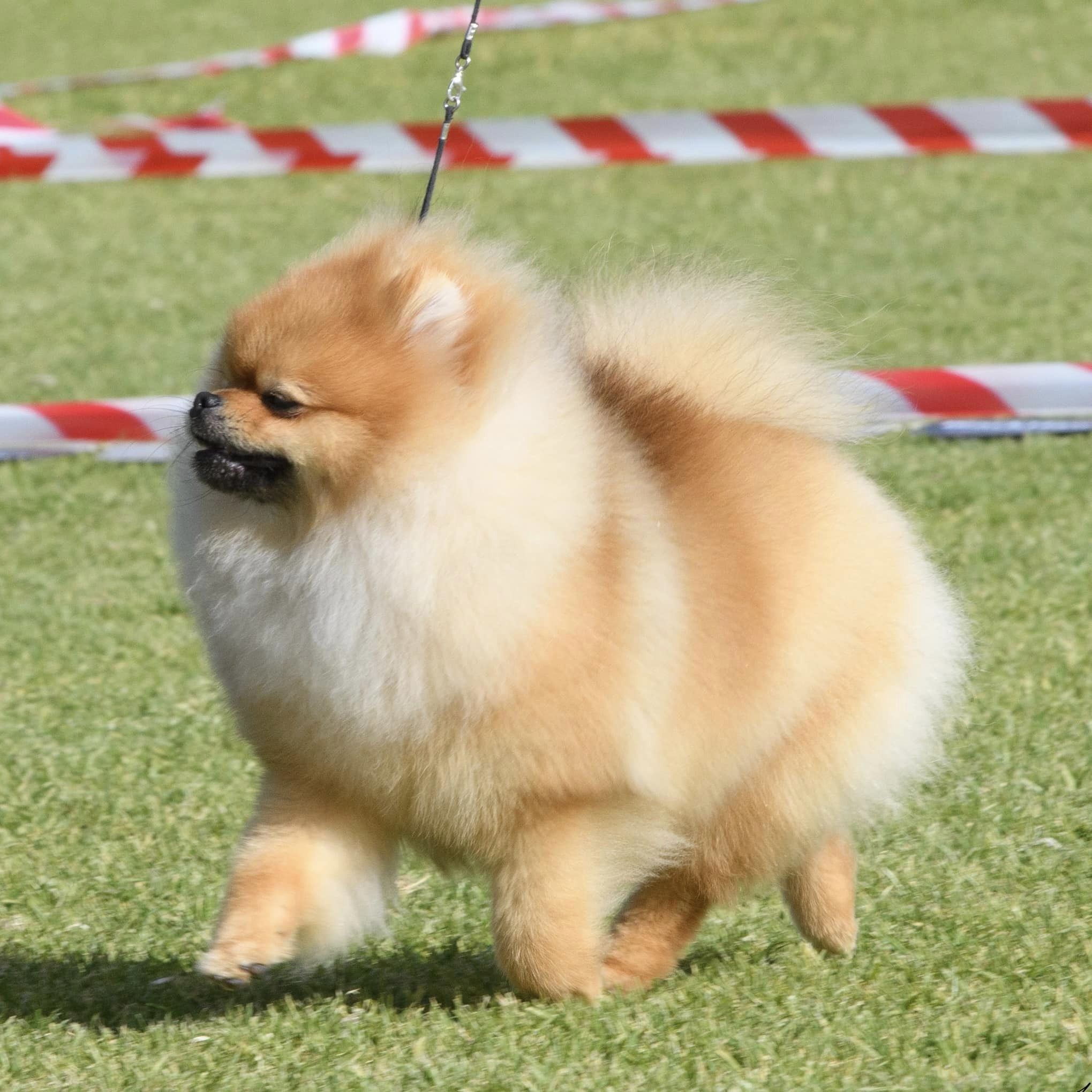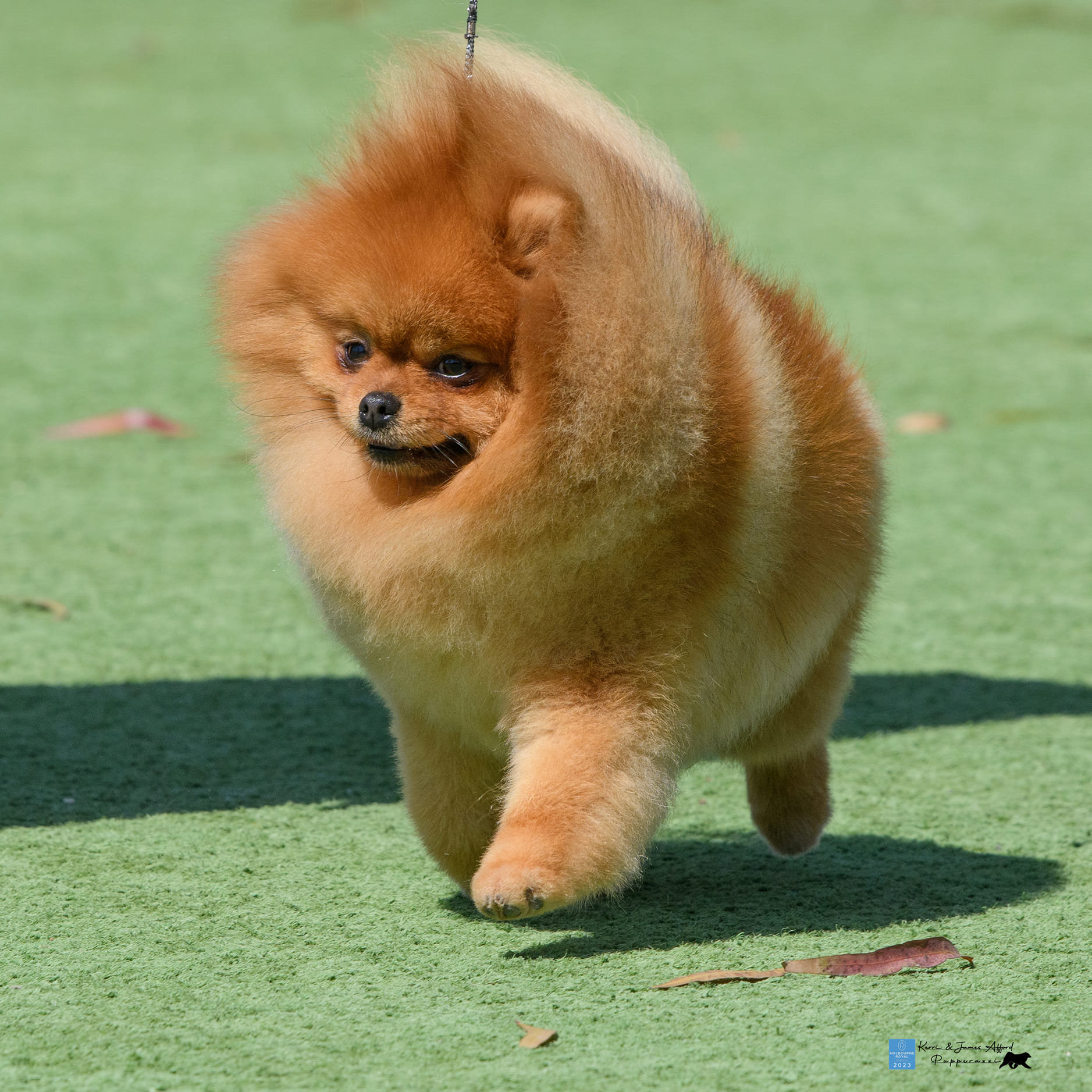Last Updated on 25/04/2024 by Dochlaggie. Post first published on June 14, 2023.
Discover the true nature of the angry Pomeranian and unravel the mysteries behind their growling, barking, and aggressive behavior. Pomeranian expert Denise Leo provides authoritative insights into why these adorable furballs sometimes show their feisty side.
Angry Pomeranians are a topic of discussion among dog lovers. Pomeranians are cute and fluffy dogs known for their loyalty and affectionate nature. However, some Pomeranians can display aggressive behavior, which can concern their owners.
In this article, we will delve into the subject of angry Pomeranians and provide insight into why some Pomeranians may exhibit aggressive behavior.
We will also discuss the different types of dog aggression and how to recognize them. By the end of this article, we hope to provide a better understanding of angry Pomeranians and help dog owners learn how to manage their pet’s behavior.
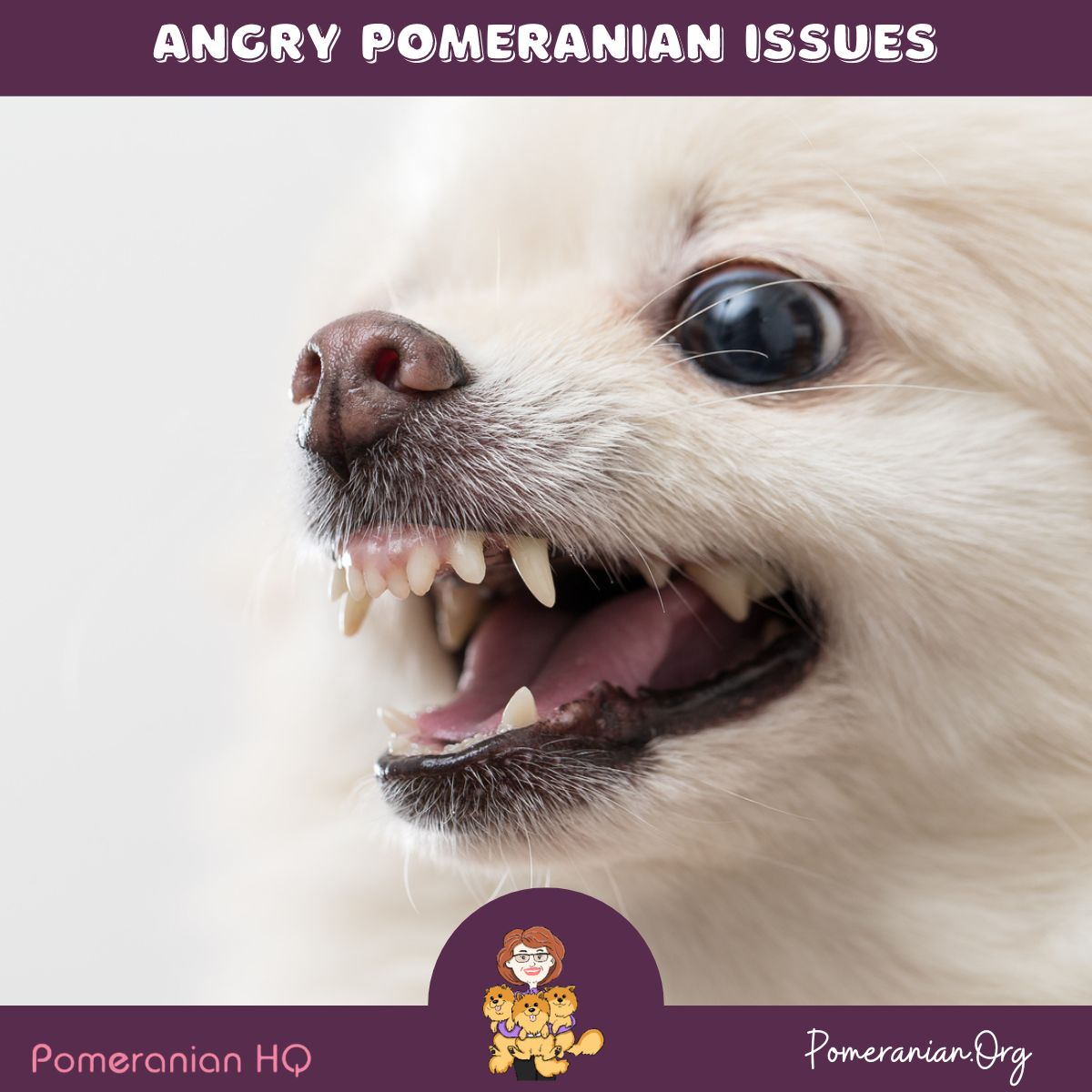
Understanding the Pomeranian Breed
Characteristics
As a breed, Pomeranians are known for being friendly, affectionate, and protective of their owners. They are small dogs, typically weighing between 3-7 pounds, and have a distinctive, fluffy coat.
Did you know that Pomeranians are incredibly adaptable and thrive in many different environments? Whether you live in a small apartment or a large home with a yard, these spunky pups can adjust and make themselves right at home.
One of the most notable characteristics of Pomeranians is their body language. They are expressive dogs and can communicate emotions through posture, facial expressions, and vocalizations. For example, a Pomeranian feeling anxious or scared may cower, tuck its tail between its legs, and avoid eye contact.
Behavior
Pomeranians are generally well-behaved dogs, but like any breed, they can exhibit problematic behaviors if not properly trained and socialized. Some common behavioral issues in Pomeranians include excessive barking, aggression towards other dogs, and separation anxiety.
Training is crucial for Pomeranian puppies to learn proper behavior and socialization skills. Teaching your Pomeranian new commands and behaviors doesn’t have to be a challenge.
Positive reinforcement techniques, such as providing treats and praise for good behavior, can effectively train your pet and reinforce desired behaviors.
Training
Training a Pomeranian requires patience, consistency, and a gentle touch. Poms respond well to positive reinforcement and praise but become stubborn if intimidated or threatened.
One of the most essential aspects of Pomeranian training is socialization. Pomeranians must be adequately socialized to become fearful or aggressive towards other dogs or people. Socialization should begin young and involve exposure to various people, animals, and environments.
Overall, Pomeranians make excellent companions for those willing to put in the time and effort to train and socialize them properly. By understanding their unique characteristics and behaviors, we can ensure that these beloved dogs lead happy, healthy, and well-behaved lives.
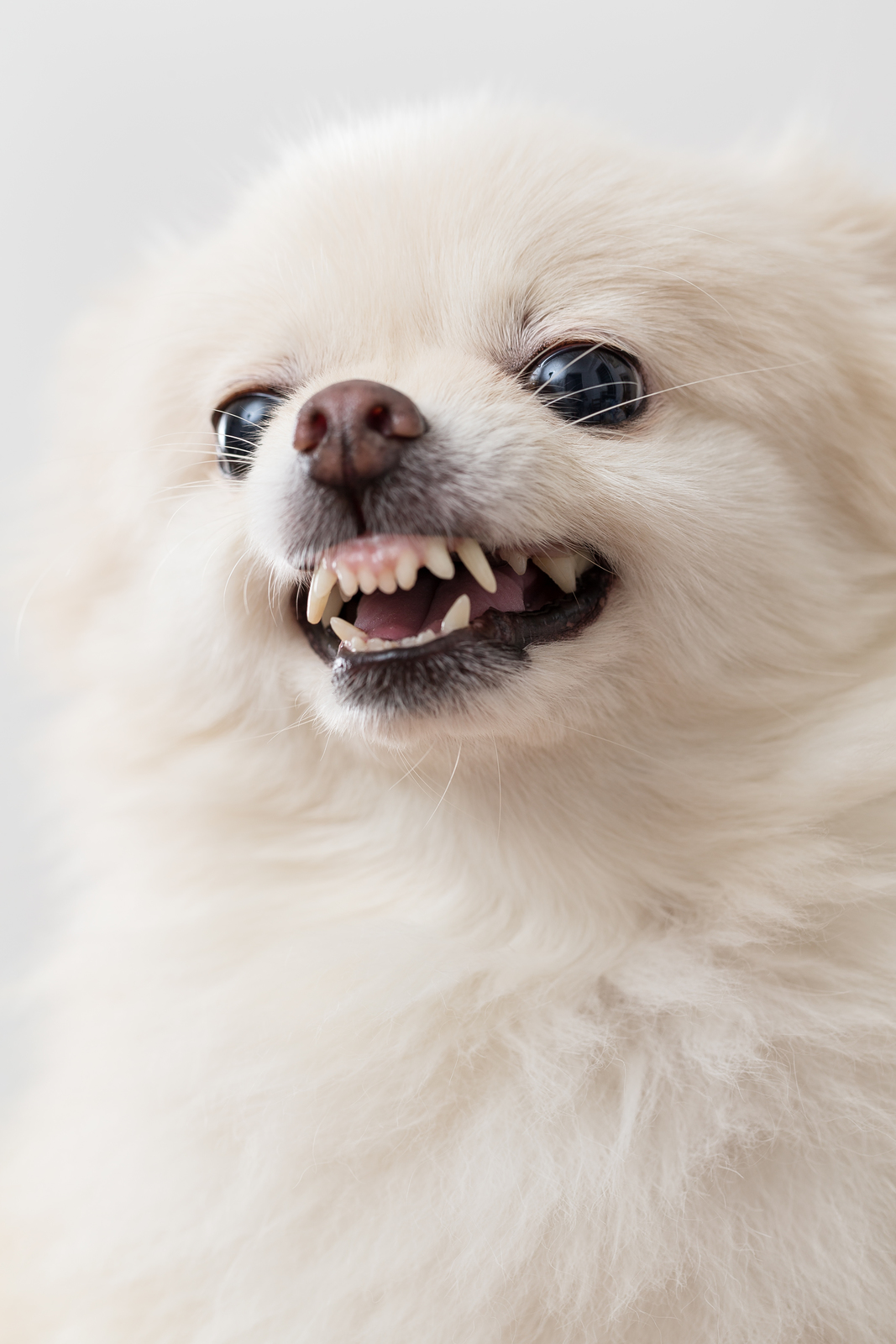
What is an Angry Pomeranian?
Pomeranians, typically known for their small size and friendly disposition, may occasionally display signs of anger. An angry Pomeranian is characterized by aggressive behavior, growling, barking, and other vocalizations that convey their displeasure.
While it is essential to recognize that not all Pomeranians are prone to anger, understanding this behavior’s triggers and underlying causes can help owners better manage and address their furry friend’s emotions.
Aggressive Behavior in Pomeranians
As Pomeranian owners, we know that our furry friends are generally loving and affectionate. However, there may be instances where our Pomeranians exhibit aggressive behavior. This section will discuss the causes, signs, and ways to deal with aggressive behavior in Pomeranians.
Occasional aggressive behavior is not uncommon among Pomeranians, although it is essential to remember that each dog is an individual with unique experiences and temperaments. Pomeranian aggression can manifest towards humans, animals, or even inanimate objects.
Identifying the root cause of aggression is crucial in determining the appropriate course of action, whether training, socialization, or seeking professional help.
Pomeranian Growling
Growling is a common expression of anger in Pomeranians. Denise Leo explains:
It is crucial for owners to approach growling with caution and to identify the underlying cause to address the issue effectively.
Angry Pomeranian Barking
Barking is another vocalization commonly associated with an angry Pomeranian. Pomeranians are known for their alertness and tendency to vocalize.
Barking can serve as a way for them to express their displeasure, demand attention, or communicate their territorial boundaries. However, excessive or uncontrollable barking may require behavioral training and intervention from a professional.
Angry Pomeranian Noises
Beyond growling and barking, Pomeranians can produce a range of other noises when angry. These noises may include snarling, whimpering, or even howling.
Understanding and interpreting these sounds can offer valuable insights into a Pomeranian’s emotional state. Owners should pay attention to these noises and seek appropriate guidance to ensure their pet’s well-being.
Why Does My Pomeranian Get Angry at Big Dogs?
One particular scenario that may trigger anger in Pomeranians is encountering larger dogs. Being small in size, Pomeranians can feel threatened or intimidated when faced with much larger canines.
This fear can manifest as anger or aggression as a defensive mechanism. Proper socialization, positive reinforcement training, and supervised interactions with larger dogs can help alleviate this issue.
Are Pomeranians Aggressive Dogs?
Contrary to popular belief, Pomeranians are not naturally aggressive dogs. However, like any other dog breed, Pomeranians may exhibit aggressive behavior for various reasons.
Don’t be surprised if your pet acts out when anxious or scared – it’s a natural response! As their owner, it’s essential to understand why they act this way and address the root issue.
Causes of Aggression
There are various reasons why a Pomeranian dog may exhibit aggressive tendencies. Common causes include lack of socialization, territorial behavior, fear, and injury. Aggression can indicate an underlying medical issue, such as epilepsy.
Signs of Aggression
It is crucial to be able to identify the signs of aggression in Pomeranians. Common symptoms include rigid body posture, shaking, panting, and growling. It is also important to note that Pomeranians may exhibit aggression towards strangers or other dogs due to their instinct to establish a hierarchy.
Dealing with Aggressive Behavior
As responsible owners, we must address aggressive behavior in our Pomeranians. One effective way to deal with aggression is through bite inhibition training.
This involves teaching your Pomeranian to control the force of their bite, which can help prevent injuries in case they exhibit aggressive behavior.
It is also essential to seek the advice of a veterinarian or professional dog trainer if you notice any signs of aggression in your Pomeranian. Surveys show that professional advice can help address aggressive behavior in dogs.
While Pomeranians are not naturally angry or aggressive dogs, they may exhibit aggressive behavior for various reasons. As responsible owners, we must identify and address the underlying causes of aggression in our furry friends.
Understanding the causes, signs, and ways to deal with aggressive tendencies in Pomeranians can ensure a safe and happy environment for our beloved pets.
Preventing Aggressive Behavior
We want our furry friends to be friendly and well-behaved. One way to prevent aggressive behavior in Pomeranians is through socialization. Puppies should be exposed to different people, animals, and environments from a young age to help them become well-adjusted adults.
Puppy socialization classes can also be a great way to introduce puppies to new experiences in a controlled environment. In addition to socialization, training is another crucial factor in preventing aggressive behavior in Pomeranians.
We should provide our Pomeranians with basic obedience training, such as sit, stay, and come, as well as more advanced training, such as leash training and teaching them not to bark excessively. Positive reinforcement, such as offering treats and praise, has effectively promoted positive behavior.
Addressing any health problems contributing to angry or aggressive behavior is also essential. Pomeranians are prone to tracheal collapse, which can cause them to become angry, irritable, and aggressive. It’s vital to take our Pomeranians to the vet regularly and address any health issues promptly.
As responsible Pomeranian owners, we should also ensure that we obtain our Pomeranians from a reputable breeder who prioritizes temperament and health. The American Veterinary Medical Association recommends that we choose a breeder willing to provide us with health certificates for the puppy’s parents and ready to answer any questions we may have about the breed.
Preventing aggressive behavior in Pomeranians requires a combination of socialization, training, and addressing any health problems that may contribute to aggressive behavior.
Frequently Asked Questions
What causes aggression in Pomeranians?
There are several reasons why a Pomeranian may act aggressively. It could be due to fear, anxiety, or lack of socialization. Poms may also become aggressive if they feel threatened or in pain. As responsible pet owners, it is crucial to identify the underlying cause of aggression in our Pomeranians and address it accordingly.
How can I train my Pomeranian to stop barking?
Barking is a typical behavior in Pomeranians. However, excessive barking can be a problem. You can use positive reinforcement techniques such as rewarding and ignoring bad behavior to train your Pomeranian to stop barking. You can also provide your Pomeranian with toys and dog treats to keep them occupied and distract them from barking.
Are Pomeranians prone to aggression?
Pomeranians are generally not aggressive dogs. However, dogs can become aggressive if they are not adequately trained, socialized, or feel threatened. As pet owners, training and socializing our Pomeranians from a young age is essential to prevent unacceptable behavior.
What are some common triggers for an angry Pomeranian?
Common triggers for an angry Pomeranian include fear, anxiety, pain, lack of socialization, and feeling threatened. Identifying and addressing the trigger is vital to prevent further aggressive behavior.
Can Pomeranians be trained to be less aggressive?
Yes, Pomeranians can be trained to be less aggressive. Positive reinforcement techniques and training tips, such as rewarding good behavior, can be used to train Pomeranians. Addressing the underlying cause of anger and socializing Pomeranians from a young age is vital to prevent it.
How do I socialize my Pomeranian to prevent aggression?
Socializing your Pomeranian from a young age is vital to prevent aggression. You can socialize your Pomeranian by exposing them to different people, places, and animals.
You can also enroll them in obedience classes and provide plenty of positive reinforcement. As pet owners, being patient and consistent when socializing our Pomeranians is essential.

Conclusion
In conclusion, Pomeranians can exhibit aggressive behavior, but it is not a trait exclusive to this dog breed. It is essential to understand that any dog can become aggressive under certain circumstances, and taking the necessary steps to prevent aggressive behavior from developing is crucial.
An angry Pomeranian may have exhibited aggressive behavior due to anxiety or fear. Socializing your Pomeranian from an early age is essential to prevent anxiety and fear from developing.
Socialization can help your Pomeranian become more comfortable around other people and animals, reducing the likelihood of aggressive behavior.
Another factor that can contribute to aggressive behavior in Pomeranians is excitement. During playtime, Pomeranians may become overly excited and start lunging or growling. Monitoring your Pomeranian during playtime is vital to prevent aggressive behavior from escalating.
It is important to note that aggressive behavior in Pomeranians is not limited to just physical aggression. Pomeranians can also exhibit aggressive behavior through vocalizations such as growling or barking.
Pomeranians are a breed of dog that can exhibit aggressive behavior, but it is not a trait that is exclusive to this breed. It is essential to socialize your Pomeranian early and monitor their behavior during playtime to prevent aggressive behavior from developing.
A little help from an expert can go a long way in managing your Pomeranian’s behavior. Reach out to a trainer or vet for assistance and training tips.
Copyright Pomeranian.org. All Rights Reserved.
References and Further Reading:
[1] Official Standard of the Pomeranian (AKC). American Kennel Club, 2011.
[2] English Kennel Club Pomeranian Breed Standard, 2017.
[3] Denise Leo, The Pomeranian Handbook.
[4] Milo G. Denlinger “The Complete Pomeranian.”
[5] Kimbering Pomeranians “1891-1991”.
[6] William Taplin’s “The Sportsman’s Cabinet.”
[7] E. Parker “The Popular Pomeranian.”
[8] Lilla Ives “Show Pomeranians.”
